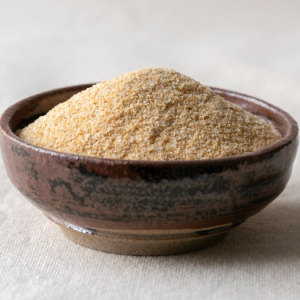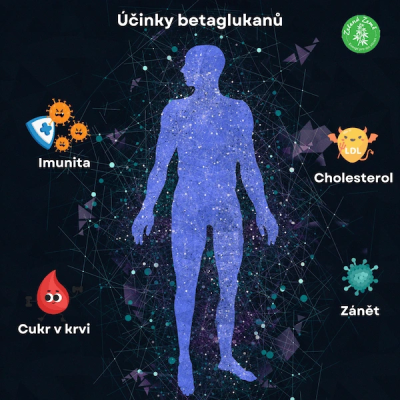Beta-glucans – Immunity starts in the gut
Author: Lucie Garabasova
The human body faces a constant barrage of external influences every day – from harmful microorganisms like bacteria and viruses to toxins and environmental stressors. To withstand these challenges, the body relies on a unique defense system – the immune system. This complex and highly sophisticated mechanism can identify and eliminate dangerous foreign substances while also monitoring the health of its own cells to prevent the onset of diseases.
The functioning of the immune system is crucial for maintaining health, which is why there is a strong focus on finding effective ways to support it. Among the substances gaining increasing attention from the scientific community and the public are beta-glucans. But what lies behind this phenomenon, and why should you consider incorporating beta-glucans into your life? This article provides the answers.
What are beta-glucans?
Beta-glucans are natural polysaccharides found in the cell walls of bacteria, yeast, fungi, algae, and certain plants like cereals. They are known for their positive effects on human health, particularly due to their ability to modulate the immune system (i.e., to influence its function so it responds appropriately to external or internal stimuli).
They occur in nature in various sources, including:
- Cereals: oats, barley
- Fungi: shiitake, reishi, oyster mushrooms
- Yeast: baker's and brewer's yeast
- Seaweed
How do beta-glucans work?
Beta-glucans act as immunomodulators, meaning they influence the activity of the immune system. Once consumed, they are recognized by specific receptors on the surface of immune cells, such as macrophages and dendritic cells (immune system cells). This interaction stimulates the immune response, enhances phagocytosis activity, and promotes the production of cytokines—signaling molecules essential for communication between immune cells.
The effects of beta-glucans include:
- Boosting the immune system: They increase the body's resistance to infections by activating immune cells and supporting their more efficient response to pathogens.
- Reducing cholesterol levels: Their consumption helps maintain normal cholesterol levels in the blood, promoting heart and vascular health.
- Regulating blood sugar levels: They can help stabilize blood glucose levels after meals, which benefits individuals with diabetes or those at risk of developing it.
- Antioxidant and anti-inflammatory effects: They reduce oxidative stress and inflammatory processes in the body, contributing to the prevention of lifestyle diseases, including cancer.
Studies on Beta-Glucans
Latest research (2023)
A recent study from 2023 explores the effects of β-glucan as a biological regulator in the human body. The study confirms that beta-glucans have the ability to modulate the immune system. It also suggests that β-glucan may help combat tumor cells. Additionally, the research highlights its cholesterol-lowering and blood sugar-stabilizing effects while confirming its antioxidant and anti-inflammatory properties. The study emphasizes the importance of β-glucan as a natural supplement with wide-ranging applications in immune support, disease prevention, and overall health improvement. It also delves into the mechanisms of its action and calls for further research to fully understand its potential in clinical practice.
"Effects of beta-glucans on the immune system" (2007)
Published in Medicina (Kaunas) by D. Akramiene et al., this study provides a comprehensive overview of the immunomodulatory properties of beta-glucans. The authors highlight that beta-glucans, naturally occurring polysaccharides found in the cell walls of bacteria, fungi, and plants, can significantly influence the immune system. Their mechanism of action involves the activation of macrophages, neutrophils, and natural killer (NK) cells, enhancing the body's ability to fight infections and tumor cells. The study also suggests that beta-glucans may serve as adjuvants in cancer immunotherapy, increase the efficacy of monoclonal antibodies, and support hematopoiesis after bone marrow damage. However, the authors note the need for further clinical studies to fully understand and confirm these effects in humans.
"Cholesterol-lowering effects of oat β-Glucan" (2011)
Published in Nutrition Reviews by Othman, Moghadasian, and Jones, this study analyzes the impact of oat β-glucan on blood cholesterol levels. The authors found that a daily intake of at least 3 grams of oat β-glucan can reduce total cholesterol and LDL ("bad") cholesterol levels by 5–10% in individuals with normal or elevated cholesterol levels. This effect is attributed to β-glucan's ability to form a viscous layer in the small intestine, which limits the absorption of dietary cholesterol and the reabsorption of bile acids. This process increases the conversion of cholesterol into bile acids, subsequently lowering LDL cholesterol levels in the blood.
"Beta-glucans in the treatment of diabetes and associated cardiovascular risks" (2008)
Published in Vascular Health and Risk Management by Jiezhong Chen and Kenneth Raymond, this study examines the potential benefits of beta-glucans in managing diabetes and its associated cardiovascular risks. The authors report that beta-glucans can help regulate blood glucose levels and reduce hypertension, both critical factors in diabetes management. Additionally, the study suggests that beta-glucans support wound healing and mitigate heart damage caused by ischemia.
Dosage and Usage Instructions
The optimal dosage of beta-glucans depends on individual needs and health conditions:
- Preventive use: 100–200 mg daily for a healthy adult.
- For health issues: Up to 500 mg daily, based on a doctor’s recommendation.
Beta-glucans are available as dietary supplements in forms such as capsules, tablets, or powder. They are naturally found in foods like oats, barley, mushrooms, and yeast. When choosing supplements, it is essential to focus on product quality and purity.
Combining beta-glucans with dietary supplements
1. Beta-Glucans and vitamin C
- Why: Vitamin C is a powerful antioxidant that supports immune functions and reduces oxidative stress. Combining it with beta-glucans enhances immune support effectiveness.
- Benefits: Improved immunity, protection against colds, and faster recovery after illness.
- Suitable for: Periods of heightened stress, seasonal infections, and recovery phases.
2. Beta-Glucans and zinc
- Why: Zinc plays a key role in tissue regeneration and proper immune system function. Together with beta-glucans, it helps fight infections.
- Benefits: Supports wound healing, enhances immune response, and protects against inflammation.
- Suitable for: Disease prevention, faster recovery, and skin issues.
3. Beta-Glucans and probiotics
- Why: Probiotics help maintain a healthy gut microbiome, which is crucial for strong immunity. Beta-glucans enhance this synergy.
- Benefits: Improved gut health, prevention of digestive problems, and enhanced overall immunity.
- Suitable for: Digestive issues, weakened immunity, and post-antibiotic recovery.
4. Beta-Glucans and collagen
- Why: Collagen is essential for the health of skin, joints, and connective tissues. Beta-glucans can promote healing and reduce inflammation in tissues.
- Benefits: Supports skin regeneration, reduces inflammation, and improves skin elasticity.
- Suitable for: Skin rejuvenation, athletes, and wound healing.
5. Beta-Glucans and omega-3 fatty acids
- Why: Omega-3 fatty acids have powerful anti-inflammatory properties and support heart health. Combining them with beta-glucans enhances cardiovascular system protection.
- Benefits: Reduces cholesterol, improves cardiovascular health, and alleviates inflammation.
- Suitable for: Individuals at risk of heart disease, those with chronic inflammation, or high cholesterol levels.
6. Beta-Glucans and adaptogens (e.g., Ashwagandha, Reishi)
- Why: Adaptogens help the body manage stress more effectively and support hormonal balance. Beta-glucans enhance resistance to infections and inflammation.
- Benefits: Improved stress management, boosted vitality, and stronger immunity.
- Suitable for: Stressful periods and improving mental resilience.
7. Beta-Glucans and vitamin D
- Why: Vitamin D regulates the immune system, and its combination with beta-glucans enhances the body's defenses.
- Benefits: Strengthened immunity, support for bone health, and reduced risk of autoimmune diseases.
- Suitable for: Weak immune systems, winter seasons, and disease prevention.
8. Beta-glucans and colostrum
- Why: Colostrum contains immunoglobulins and growth factors that support specific immunity and tissue regeneration. Combined with beta-glucans, which modulate innate immune responses, they provide comprehensive protection and accelerate recovery.
- Benefits: Enhanced immunity, faster tissue regeneration, support for gut health, and infection prevention.
- Suitable for: Individuals with weakened immunity, children and seniors, athletes, and those in recovery.
For its unique properties, Cannadorra has decided to include this dietary supplement in its range and is excited to soon introduce a new product designed to boost your immunity!
Safety and potential side effects
Beta-glucans are considered safe for most people, including children, pregnant, and breastfeeding women. No serious side effects or risks of dependency are known. However, it is advisable to consult a doctor before using beta-glucans, particularly if you are on other medications or have specific health conditions.
Beta-Glucans in disease prevention and treatment
Due to their immunomodulatory, antioxidant, and anti-inflammatory properties, beta-glucans may play a role in preventing and supporting the treatment of various diseases, including infectious diseases, cardiovascular conditions, and certain types of cancer. Their effectiveness in these areas is the subject of numerous clinical studies.
Why should you incorporate Beta-Glucans into your daily life?
Beta-glucans are natural compounds with a wide range of health benefits. Including beta-glucan-rich foods in your diet or taking high-quality supplements can help strengthen your immune system, regulate cholesterol and blood sugar levels, and improve overall health. However, consulting a healthcare professional is essential, especially if you have existing health issues or are taking other medications.


